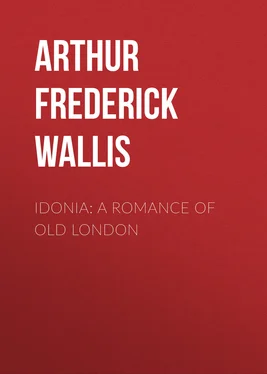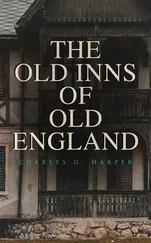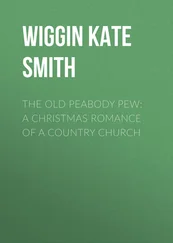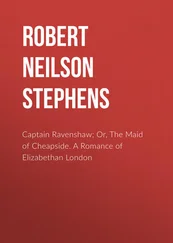Arthur Wallis - Idonia - A Romance of Old London
Здесь есть возможность читать онлайн «Arthur Wallis - Idonia - A Romance of Old London» — ознакомительный отрывок электронной книги совершенно бесплатно, а после прочтения отрывка купить полную версию. В некоторых случаях можно слушать аудио, скачать через торрент в формате fb2 и присутствует краткое содержание. Жанр: foreign_prose, literature_20, foreign_antique, на английском языке. Описание произведения, (предисловие) а так же отзывы посетителей доступны на портале библиотеки ЛибКат.
- Название:Idonia: A Romance of Old London
- Автор:
- Жанр:
- Год:неизвестен
- ISBN:нет данных
- Рейтинг книги:4 / 5. Голосов: 1
-
Избранное:Добавить в избранное
- Отзывы:
-
Ваша оценка:
- 80
- 1
- 2
- 3
- 4
- 5
Idonia: A Romance of Old London: краткое содержание, описание и аннотация
Предлагаем к чтению аннотацию, описание, краткое содержание или предисловие (зависит от того, что написал сам автор книги «Idonia: A Romance of Old London»). Если вы не нашли необходимую информацию о книге — напишите в комментариях, мы постараемся отыскать её.
Idonia: A Romance of Old London — читать онлайн ознакомительный отрывок
Ниже представлен текст книги, разбитый по страницам. Система сохранения места последней прочитанной страницы, позволяет с удобством читать онлайн бесплатно книгу «Idonia: A Romance of Old London», без необходимости каждый раз заново искать на чём Вы остановились. Поставьте закладку, и сможете в любой момент перейти на страницу, на которой закончили чтение.
Интервал:
Закладка:
And so fair did I find all, the high street wide and sweet and the houses thereon neat and well ordered, the great castle, moreover, on a mount at the nether end, very fencible and stately builded, that it was not long ere my spirits rose again, and I thought no more upon Captain Cutts and his departing. Methought the countryside had never seemed so pleasant as now under its web of frost, and the trees a kind of blue of the colour of silver-work tarnished by age, the sky red behind them reaching up from grey. I left the middle part of the town soon and got into the lanes, where at length I came by chance upon an ancient mill, which was once, I learned, a monkish mill whither every man had perforce to bring his grain to be ground. Now as I stood idly by the gate of the mill-house I heard voices of men in talk, and, without further intention, could not but catch some words of their discourse. It was evident that a bargain was going forward, and that one sold grudgingly.
"Nay," said the one voice, "for this standard of red buckram, sevenpence and no less, Master Ptolemy."
"Thou puttest me to uncommon great charges, Master Skegs," replied the other invisible; "what with thy gilding and thy scarlet hoods, and now this standard of the devil! Ay, and besides there is that crazy mitre of Cayphas, which, o' my conscience, is not worth the half a groat."
"'A cost me two shillings not twelvemonth since," cried the first invisible in a manifest rage, "yet am I willing to sell it thee for one shilling and ninepence as I have set it down in the bill, where is also to be found a coat of skins; item, a tabard; item, Herod's crest of iron; all which I have grossly undervalued. Ah! there be some," he interjected, in a whining voice, "there be some that would buy up all Jewry for a parcel of bawdy, torn ballads. Art not ashamed, Ptolemy Philpot, thou a Christian man, to purchase so divine a tragedy for so mean a sum?" But the invisible Ptolemy not replying, the invisible Skegs proceeded:
"Well, thou hast heard my price, master, which is three pounds sixteen shillings in all, and look you! to avoid all bitterness and to make an end, I will throw in the parchment beasts of the Deluge for the same."
What manner of cheapening was here I could not conceive, and so (still chiding my lack of manners) crept through the gate and to a coign of the mill-house, where I might observe these strange traders in parchment beasts and red buckram. And observe them I did, indeed, and they me at the same instant; which discovery so confused me that I stood before them first on one foot and then on the other, with no sense to go or stay, nor to cover my discourtesy with any plausible excuse. Howbeit, one, whom I took (and rightly) to be Ptolemy, burst into laughter at this my detected intrusion, and bade me step forward and judge betwixt them. He was a big man, with a child's face for all that he wore a great beard, and a terrible nose of the colour of the stone they call agate, it being veined too and marvellous shining. Yet his voice was small like a child's, and I saw at once that in any bargain he was like to get the worse of it. The other man, whose name was Skegs, had a woeful pallor, but an undaunted behaviour and a very fierce eye. Between them stood the cause of their difference, which was a sort of wheeled pageant or cart of two stages; the upper being open and about five feet in breadth, with a painted cloth behind; the lower room enclosed, and was, I learned, for the convenience and disposal of the puppet master (this being a puppet-show and the puppets appearing, as players do, on the stage above).
Coming forward, then, as I was bidden, I very modestly awaited the argument between Mr. Skegs and Ptolemy, being pleased to be trusted in so notable a cause. But it fell out otherwise, for Skegs swore by the body of St. Rumbold he would have no arbitrament, and that his price was three pound and sixteen shillings, as he had already said.
"It is a great sum," said Ptolemy, in his piping reed voice.
"How, great?" retorted Skegs, "seeing I sell thee the pageant-car itself, together with Nicodemus, Pilate, and four stout Torturers, besides the holy folk, and all their appurtenance. And were I not at the gate of the grave myself, I would not part with so much as Joseph's beard for twice this reckoning."
"He gives you also certain parchment beasts, Mr. Ptolemy," said I, very judicially.
"I retract the beasts," cried the pageant master, whose red eyes blazed terribly, and he danced with vexation of my ruling.
"Look you, now," grumbled Ptolemy, running his great hand through his beard, "was ever such a fellow!"
"'Tis a part of the Deluge," said Mr. Skegs, "and to bring in beasts before the judgment-seat of Pilate were against all Scripture. But contrariwise, as it toucheth the Interlude of the Deluge, mass! without those beasts of mine, the cats and dogs too (as the verse goes)—
"'Otter, fox, fulmart also;
Hares hopping gaily'
withouten these wherefore was Noah's ark builded, and so great a stir made?"
"But if you be about to die, Master Skegs," I put in, "as you say you are, of what advantage is this same Deluge to you?"
"Ay, truly," cried Ptolemy, "for thou hast no wife, man, nor any dependent on thee. So thou be decently buried, 'tis all one whether I have the parchment beasts or thou."
"Would you spoil me of my heritage?" cried the pallid man in an extremity of rage, "and strip me naked before I be come to the grave? I say thou shalt not have the beasts."
"Wilt thou sell me the Deluge outright?" asked Ptolemy after a silence, "for I am no hand at this chaffering."
"Ay, for a further fourteen shillings, I will," said Skegs promptly, "which maketh in all four pounds and ten shillings; and for that, I give thee Noah, a new figure of wood, and Noah's wife, who truly is somewhat worsened by usage, but not past mending; Shem also, Ham and Japhet, stalwart lads all, and their wives corresponding. An ark there is, moreover, which was builded in Rye by a shipwright out of battens and good gummed canvas. The beasts be all whole, save the weasel, but that signifieth not. I have a schedule of them, and the parts of the players in good scrivener's hand. All these shalt thou have for a matter of four pounds thirteen shillings and fourpence."
"Four pounds and ten shillings, Master Skegs," said Ptolemy, dismayed at this unconscionable addition.
"Said I aught of the ark when I named that price?" asked Skegs scornfully. "Wouldst thou haggle with a dying man, Ptolemy Philpot?"
"I will furnish the remainder shillings," I whispered to Ptolemy, who stood in a maze to answer such imposture as Skegs sought to lay upon him. "Strike the bargain, Mr. Ptolemy, and pay when thou hast checked over the tale of beasts."
He thanked me like a pleased stripling, and, to be short, purchased all for the sum named, which, there being seven or eight pieces not found, and Japhet's leg burst from the pin, methought sufficient, albeit Mr. Skegs at every turn sought to increase it, or else detract some piece of note, as Mount Ararat in pasteboard and the dove with a sprig of olive.
"I have forgot the raven," he screamed after us, as at length we went away with our cartful of miracles. "'Twas new varnished at Michaelmas, and there is the cost of the varnish you must repay me, which is three-pence halfpenny," at which, when we replied not, he ran into the mill-house in a sort of fury, and as I understood, died there a week later, muttering upon his "cocks and kites and crows," his
"Rooks and ravens, many rows;
Cuckoos, curlews, whoso knows,
Each one in his kind;"
and putting a price upon each particular fowl, like any poulter in Cheape. I never met a man so engrossed in business to so little purpose, nor one (to do him justice) so little put out of his humour of acquisition by the near approach of death. He had bought the mill, so Ptolemy told me, out of his former profits, knowing nothing of the miller's trade, but because it was to be got at an advantage.
Читать дальшеИнтервал:
Закладка:
Похожие книги на «Idonia: A Romance of Old London»
Представляем Вашему вниманию похожие книги на «Idonia: A Romance of Old London» списком для выбора. Мы отобрали схожую по названию и смыслу литературу в надежде предоставить читателям больше вариантов отыскать новые, интересные, ещё непрочитанные произведения.
Обсуждение, отзывы о книге «Idonia: A Romance of Old London» и просто собственные мнения читателей. Оставьте ваши комментарии, напишите, что Вы думаете о произведении, его смысле или главных героях. Укажите что конкретно понравилось, а что нет, и почему Вы так считаете.












